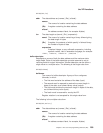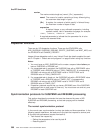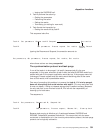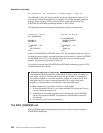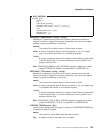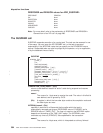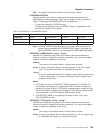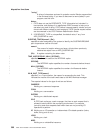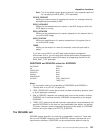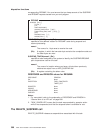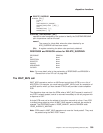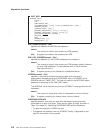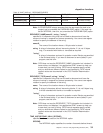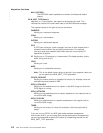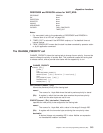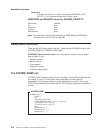Note: This is the default reason given to the wait if you suspend a task and
do not specify the WLM_WAIT_TYPE parameter.
OTHER_PRODUCT
Waiting on another product to complete its function; for example, when the
workload has been passed to DB2.
SESS_LOCALMVS
Waiting on the establishment of a session in the MVS image on which this
CICS region is running.
SESS_NETWORK
Waiting on the establishment of a session elsewhere in the network (that is,
not on this MVS image).
SESS_SYSPLEX
Waiting on establishment of a session somewhere in the sysplex (that is,
not on this MVS image).
TIMER
Waiting on the timeout of a timer (for example, a task that puts itself to
sleep).
If you are running CICS in an MVS goal-mode workload management
environment (that is, you are using goal-oriented performance management),
you are recommended to specify the reason for suspending the task on the
WLM_WAIT_TYPE parameter.
RESPONSE and REASON values for SUSPEND:
RESPONSE REASON
OK None
EXCEPTION None
DISASTER None
INVALID None
KERNERROR None
PURGED TASK_CANCELLED
TIMED_OUT
Notes:
1. For more detail, refer to the explanation of RESPONSE and REASON in
“General form of an XPI call” on page 286.
2. ‘TASK_CANCELLED’ means that the task has been canceled by operator action
or by an application command.
3. After a ‘PURGED’ response, the suspend token must not be reused in another
SUSPEND until it has been reset by a RESUME corresponding to the purged
SUSPEND.
4. ‘TIMED_OUT’ means that the task has been automatically resumed because the
specified INTERVAL (or the time-out value specified at task attach) has expired.
The token, however, remains suspended and must be the object of a RESUME
before it can be the object of a DELETE_SUSPEND.
The RESUME call
RESUME restarts execution of a task that is suspended or timed out. There must
be only one RESUME request for each SUSPEND. However, because this is an
asynchronous interface, a SUSPEND can be received either before or after its
dispatcher functions
Chapter 3. The user exit programming interface (XPI) 307



